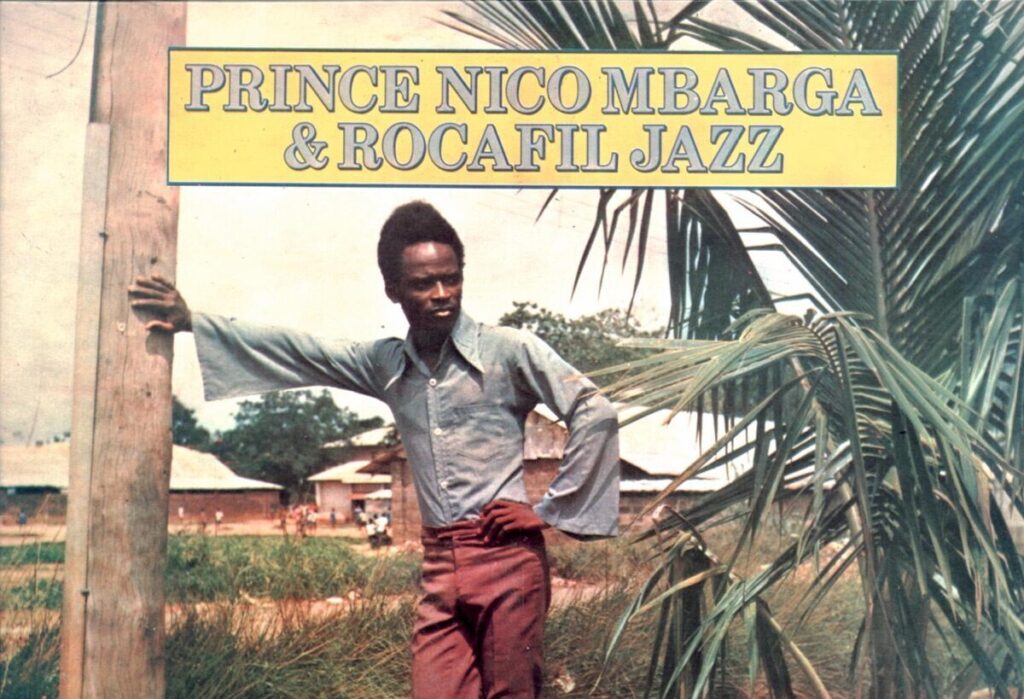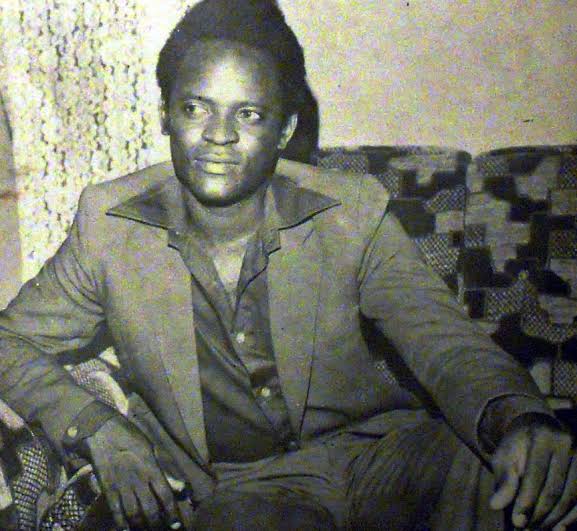ARTS, STYLE & ENTERTAINMENT
This is YOUR lifestyle gallery – of what is new and what is happening in the U.S. And the Black World, not excluding Africa. For this section if you have any news we should know about – let us know at: [email protected]
‘Sweet Mother’: Prince Nico Mbarga Remains The Man Who Sang Africa’s Most Popular Song

Born on January 1, 1950, in Abakaliki, southeastern Nigeria, to a Nigerian mother and a Cameroonian father, Prince Nico Mbarga was the second of four children, and grew up in a multicultural household that exposed him to a variety of musical styles and traditions. Mbarga’s father was a trader who frequently traveled between Nigeria and Cameroon, and his mother was a teacher.
Despite his father’s absence for much of his childhood, Mbarga maintained a close relationship with his father and often accompanied him on his travels. During these trips, Mbarga was exposed to a wide range of music, including the popular Congolese rumba and Cameroonian highlife styles. Mbarga’s family settled in the town of Ikom, in southeastern Nigeria, when he was a young boy. It was here that he first began to develop his musical talents.
As a teenager, he formed a band called the Melody Orchestra with his friends, and began performing at local dances and events. Despite his early success as a musician, Mbarga’s parents were initially resistant to the idea of him pursuing a career in music. They encouraged him to focus on his education and pursue a more stable career path. However, Mbarga’s passion for music was too strong to ignore, and he continued to play and perform whenever he had the opportunity.
As Mbarga’s career began to take off in the 1970s, he remained close to his family and often returned to Ikom to visit them. He was particularly close to his younger sister, Grace, who was also a talented musician. Sadly, Mbarga’s life was cut short when he died in a motorcycle accident in 1997, at the age of 47.
However, his music continues to live on and inspire new generations of musicians and fans. In many ways, Mbarga’s childhood and family played an important role in shaping his musical style and his approach to music. His multicultural background and exposure to a variety of musical traditions gave him a unique perspective that was reflected in his music, which blended elements of African highlife, Congolese rumba, and other styles. And his close relationship with his family instilled in him a sense of community and connection that was evident in his performances, which often brought people together in joyous celebration.

Early Interest in Music, Musical Influence and Style
Prince Nico Mbarga’s early interest in music began during his childhood in Ikom, Nigeria, where he grew up in a multicultural household that exposed him to a variety of musical styles and traditions. He was particularly influenced by the music of his father’s native Cameroon, as well as by the Congolese rumba music that was popular in West Africa at the time. As a teenager, Mbarga formed a band called the Melody Orchestra with his friends. The band played at local events and dances, and quickly gained a following in their community.
Mbarga’s unique voice and guitar-playing skills were already evident at this early stage, and he quickly became known as a talented musician. In the early 1970s, Mbarga formed a new band called Rocafil Jazz. The band’s name was a play on words, combining the name of Mbarga’s hometown (Rocha) with the word “caf,” which was a slang term for a popular type of Nigerian motorbike at the time. The band quickly gained popularity in Nigeria and throughout West Africa, and began to attract attention from record labels and producers.
Mbarga’s musical style was heavily influenced by the highlife and rumba music that he had grown up listening to, as well as by the popular music of his time. He was known for his melodic guitar playing, which blended elements of West African and Latin American music, and his smooth, soulful singing voice.
Mbarga’s lyrics were often playful and humorous, with a focus on love, romance, and the joys of everyday life. He sang in a mix of English, Pidgin English, and his native language, Efik, which helped to make his music accessible to a wide audience. One of Mbarga’s most famous songs, “Sweet Mother,” was written during this period and became a massive hit in Africa and around the world. The song’s catchy melody and heartfelt lyrics, which celebrated the love and sacrifice of mothers, struck a chord with audiences everywhere and helped to cement Mbarga’s place as one of Africa’s most popular musicians.
Mbarga’s early interest in music and formation of bands were key factors in his eventual success as a musician. His unique blend of musical styles, combined with his charismatic stage presence and lyrical talent, helped to make him a beloved figure in African music and culture.
Sweet Mother as Africa’s Most Popular Song
Sweet Mother” is perhaps the most well-known song of Prince Nico Mbarga’s career, and it has become a classic of African music. The song was written and recorded in 1976, during a time of great creativity and success for Mbarga. Mbarga wrote the song in his native language, Efik, and the lyrics celebrated the love and devotion of mothers everywhere. The song’s catchy melody and upbeat tempo quickly made it a favorite among fans, and it became a huge hit throughout Africa and beyond.
The recording process for “Sweet Mother” was relatively simple. Mbarga and his band, Rocafil Jazz, recorded the song at a small studio in Lagos, Nigeria. The band consisted of Mbarga on guitar and vocals, as well as a group of talented musicians who provided backing vocals and instrumentation. The recording was made using a basic four-track recorder, which was a common tool for recording music in Nigeria at the time. Mbarga and his bandmates worked quickly and efficiently, laying down the basic tracks for the song in just a few hours. After the initial recording was complete, Mbarga and his British-trained music producer, Lemmy Jackson Otu, added a few final touches to the mix, including some subtle percussion and backing vocals.

The finished song was then released on a small independent record label, and it quickly became a sensation. “Sweet Mother” went on to become one of the best-selling African songs of all time, with millions of copies sold worldwide. It has been covered by countless artists, and has become a staple of African music and culture. For Mbarga, the success of “Sweet Mother” was both a blessing and a curse. While the song brought him fame and fortune, it also overshadowed much of his other work, and he was often asked to perform it at the expense of other songs in his repertoire
Reception and Success of Sweet Mother and its impact on African Music
“Sweet Mother” by Prince Nico Mbarga is one of the most successful African songs of all time. Since its release in 1976, the song has had a profound impact on African music and culture, and it continues to be celebrated and enjoyed by fans around the world. The reception and success of “Sweet Mother” was immediate and overwhelming. The song quickly became a hit throughout Africa, and it soon spread to other parts of the world. Its catchy melody, upbeat tempo, and heartfelt lyrics resonated with audiences everywhere, and it became a favorite among people of all ages and backgrounds.
The song’s popularity also helped to raise the profile of African music around the world. It was one of the first African songs to achieve such widespread success outside of the continent, and it paved the way for other African artists to gain international recognition and acclaim. “Sweet Mother” has been covered by countless artists over the years, and it has been featured in movies, TV shows, and advertisements around the world. It has become a cultural touchstone for many Africans, and it is often played at weddings, graduations, and other important events.
The success of “Sweet Mother” also had a profound impact on Mbarga’s career. He became one of the most popular and influential African musicians of his time, and he continued to record and perform music until his untimely death in 1997. But perhaps the greatest impact of “Sweet Mother” was its celebration of mothers and the important role they play in African culture. The song’s lyrics are a tribute to the love, sacrifice, and devotion of mothers everywhere, and they continue to resonate with people of all ages and backgrounds.
In many ways, “Sweet Mother” has become a symbol of African resilience, strength, and unity. It has helped to foster a sense of pride and identity among Africans, and it has inspired generations of musicians and artists to create music that celebrates their culture and heritage. The reception and success of “Sweet Mother” is a testament to the power of music to bring people together, to inspire, and to uplift. It remains a beloved classic of African music, and it will continue to be celebrated and enjoyed for generations to come as a cultural touchstone.
The Impact of Prince Nico Mbargo on Africa Identity and Culture
Prince Nico Mbarga’s impact on African culture and identity is difficult to overstate. As one of the most successful African musicians of all time, his music has had a profound influence on the way Africans view themselves and their place in the world. Mbarga’s music celebrated the rich and diverse cultural heritage of Africa, and it helped to reinforce a sense of pride and identity among Africans.
His music incorporated elements of traditional African rhythms, as well as contemporary styles such as funk, jazz, and highlife, creating a unique sound that reflected the complexity and diversity of African society. Mbarga’s music was also deeply rooted in the social and political realities of Africa. His lyrics often addressed issues such as corruption, poverty, and inequality, and he used his music as a platform to raise awareness of these issues and advocate for change.
Mbarga’s impact on African culture and identity can be seen in a number of ways. Firstly, his music helped to establish African music as a genre that could hold its own on the global stage. By achieving widespread success both in Africa and internationally, Mbarga helped to demonstrate that African music was not just a niche genre, but a powerful force that could resonate with audiences around the world. Secondly, Mbarga’s music helped to foster a sense of unity among Africans.
His music celebrated the diversity and complexity of African society, but it also emphasized the commonalities that bind Africans together. His music was a celebration of African resilience, strength, and unity, and it helped to foster a sense of pride and identity among Africans. Finally, Mbarga’s impact on African culture and identity can be seen in the enduring popularity of his music.
Decades after his death, his music continues to be celebrated and enjoyed by fans around the world. His music has become a symbol of African culture and identity, and it continues to inspire new generations of African artists and musicians. In conclusion, Prince Nico Mbarga’s impact on African culture and identity is a testament to the power of music to inspire, to unite, and to uplift.
His music helped to establish African music as a global genre, and it fostered a sense of pride and identity among Africans. His music continues to be celebrated and enjoyed today, and it remains an important part of African cultural heritage
Subscribe to Read and Access Exclusive Contents
Join Business executives, political leaders, experts and top professionals in America, Africa and the rest of the Pan-African World who trust and read The African Times USA always.
Newsletter
Subscribe to our bi-weekly newsletter and be the first to Receive New Updates.
Your comments, ideas, and thoughts matter.
Drop us a line: